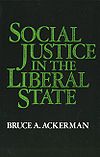
Social Justice in the Liberal State
Encyclopedia

Bruce Ackerman
Bruce Arnold Ackerman is an American constitutional law scholar. He is a Sterling Professor at Yale Law School and one of the most frequently cited legal academics in the United States....
, recipient of the French Order of Merit, Sterling Professor of Law and Political Science at Yale, and the author of fifteen books that have had a broad influence in political philosophy, constitutional law, and public policy. The book is an essay in political philosophy, a "new view" of the theoretical foundations of liberalism that will "challenge us to clarify our own implicit notions of liberal democracy." Ackerman addresses the positive case for a liberalism that glorifies neither the state bureaucracy nor the private market. References to the sphere of relations among states are few, but the breadth of the attack on the fundamental issues of man and society is impressive. To Ackerman, liberalism is a kind of structured conversation in which verbal negotiation among those with differing visions of the good life is an alternative to the exercise of naked power. Ackerman has mounted a profound challenge to contract thinking. It works, crudely, on the idea that the premises of a course of contract reasoning can be manipulated so as to yield (more or less) any conclusion that the theorist has some antecedent interest in producing. The social contract is the contract which would be confirmed by the entire population, under ideal conditions, after perfect and complete consideration. Ackerman has offered a suggestion for determining whether any persons among a genetically diverse group are genetically disadvantaged. His suggestion is that, to be genetically undominated, a person must possess a set of abilities that permit him to pursue some life purpose that some persons have, with as much facility as any other person is able to pursue that life purpose. And Ackerman asserts that every person has a right to be genetically undominated. The privatization of religious convictions is also strongly defended. Ackerman argues for a maximal separation doctrine in that religion does not have an appropriate place in the public realm of a liberal democracy. The book also briefly suggests "responsive lotteries", prototypes of lottery voting as a way to decide issues, but leaves the question hanging in the air, inviting others to devote more serious thought to lottery voting.
See also
- Bruce AckermanBruce AckermanBruce Arnold Ackerman is an American constitutional law scholar. He is a Sterling Professor at Yale Law School and one of the most frequently cited legal academics in the United States....
- Political philosophyPolitical philosophyPolitical philosophy is the study of such topics as liberty, justice, property, rights, law, and the enforcement of a legal code by authority: what they are, why they are needed, what, if anything, makes a government legitimate, what rights and freedoms it should protect and why, what form it...
- Social contractSocial contractThe social contract is an intellectual device intended to explain the appropriate relationship between individuals and their governments. Social contract arguments assert that individuals unite into political societies by a process of mutual consent, agreeing to abide by common rules and accept...
- Social justiceSocial justiceSocial justice generally refers to the idea of creating a society or institution that is based on the principles of equality and solidarity, that understands and values human rights, and that recognizes the dignity of every human being. The term and modern concept of "social justice" was coined by...
External links
- Social Justice in the Liberal State at Yale University Press
Related works
- Citizenship: European and Global at Universitetet i Oslos
- Common schooling and educational choice at Washington University in St. Louis
- Just Health Care and the Two Solidarities at Harvard Center for Population and Development Studies
- Religious Virtues, Religious Vices at George Mason University
Scholastic inclusion
- Public Lectures Academic Year 2002/2003 at Collegium Budapest Institute for Advanced Study
- SOC321 Social Justice at Lingnan University
- PH 3538 Social and Political Philosophy at University of Aberdeen
- SOCIAL JUSTICE RESOURCES at Colorado Christian University

